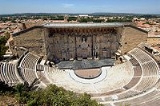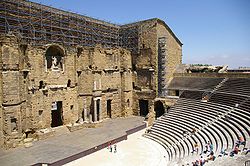
Théâtre antique d'Orange
Encyclopedia
The Théâtre antique d'Orange ("Ancient Theatre of Orange") is an ancient Roman theatre
, in Orange
, southern France, built early in the 1st century CE. It is owned by the municipality
of Orange and is the home of the summer opera
festival, the Chorégies d'Orange
.
It is one of the best preserved of all the Roman theatres in the Roman colony of Arausio (or, more specifically, Colonia Julia Firma Secundanorum Arausio: "the Julian colony of Arausio established by the soldiers of the second legion") which was founded in 40 BC. Playing a major role in the life of the citizens, who spent a large part of their free time there, the theatre was seen by the Roman authorities not only as a means of spreading Roman culture to the colonies, but also as a way of distracting them from all political activities.
Mime, pantomime, poetry readings and the "attelana" (a kind of farce rather like the commedia dell'arte
) was the dominant form of entertainment, much of which lasted all day. For the common people, who were fond of spectacular effects, magnificent stage sets became very important, as was the use of stage machinery. The entertainment offered was open to all and free of charge.
 As the Western Roman Empire
As the Western Roman Empire
declined during the 4th century, by which time Christianity
had become the official religion, the theatre was closed by official edict in AD 391 since the Church opposed what it regarded as uncivilized spectacles. After that, the theatre was abandoned completely. It was sacked and pillaged by the "barbarian
s" and was used as a defensive post in the Middle Ages
. During the 16th-century religious wars, it became a refuge for the townspeople.
, who then held the position of director of "Monuments Historiques". Under his direction, restoration work began in 1825 and in 1869 the theatre became the home of a "Roman Festival" which celebrated the glory of Rome and included a performance of Méhul's opera, Joseph
. In the latter part of the century, all the major players of the French classical stage appeared in the Orange festivals, including Sarah Bernhardt
who played "Phèdre" in 1903.
By the end of the century, the tiered seats were restored, a reflection of the bureaucratic process. In 1902 the festival was given a new name, the "Chorégies," planned as an annual summer festival. The name comes from the tax that was imposed on wealthy Romans to pay for theatrical productions. Until 1969 the Chorégies consisted of plays, alternating with musical works, opera and symphonies. However, after that date, Orange became solely an opera festival and theatrical works were performed at Avignon.
In 1981 UNESCO
declared the theatre as a World Heritage Site
.
Roman theatre (structure)
The characteristics of Roman to those of the earlier Greek theatres due in large part to its influence on the Roman triumvir Gnaeus Pompeius Magnus. Much of the architectural influence on the Romans came from the Greeks, and theatre structural design was no different from other buildings...
, in Orange
Orange, Vaucluse
Orange is a commune in the Vaucluse department in the Provence-Alpes-Côte d'Azur region in southeastern France.It has a primarily agricultural economy...
, southern France, built early in the 1st century CE. It is owned by the municipality
Municipality
A municipality is essentially an urban administrative division having corporate status and usually powers of self-government. It can also be used to mean the governing body of a municipality. A municipality is a general-purpose administrative subdivision, as opposed to a special-purpose district...
of Orange and is the home of the summer opera
Opera
Opera is an art form in which singers and musicians perform a dramatic work combining text and musical score, usually in a theatrical setting. Opera incorporates many of the elements of spoken theatre, such as acting, scenery, and costumes and sometimes includes dance...
festival, the Chorégies d'Orange
Chorégies d'Orange
The Chorégies d'Orange is a summer opera festival held each year in August in Orange located about seventy miles northwest of Marseille in southern France...
.
It is one of the best preserved of all the Roman theatres in the Roman colony of Arausio (or, more specifically, Colonia Julia Firma Secundanorum Arausio: "the Julian colony of Arausio established by the soldiers of the second legion") which was founded in 40 BC. Playing a major role in the life of the citizens, who spent a large part of their free time there, the theatre was seen by the Roman authorities not only as a means of spreading Roman culture to the colonies, but also as a way of distracting them from all political activities.
Mime, pantomime, poetry readings and the "attelana" (a kind of farce rather like the commedia dell'arte
Commedia dell'arte
Commedia dell'arte is a form of theatre characterized by masked "types" which began in Italy in the 16th century, and was responsible for the advent of the actress and improvised performances based on sketches or scenarios. The closest translation of the name is "comedy of craft"; it is shortened...
) was the dominant form of entertainment, much of which lasted all day. For the common people, who were fond of spectacular effects, magnificent stage sets became very important, as was the use of stage machinery. The entertainment offered was open to all and free of charge.

Roman Empire
The Roman Empire was the post-Republican period of the ancient Roman civilization, characterised by an autocratic form of government and large territorial holdings in Europe and around the Mediterranean....
declined during the 4th century, by which time Christianity
Christianity
Christianity is a monotheistic religion based on the life and teachings of Jesus as presented in canonical gospels and other New Testament writings...
had become the official religion, the theatre was closed by official edict in AD 391 since the Church opposed what it regarded as uncivilized spectacles. After that, the theatre was abandoned completely. It was sacked and pillaged by the "barbarian
Barbarian
Barbarian and savage are terms used to refer to a person who is perceived to be uncivilized. The word is often used either in a general reference to a member of a nation or ethnos, typically a tribal society as seen by an urban civilization either viewed as inferior, or admired as a noble savage...
s" and was used as a defensive post in the Middle Ages
Middle Ages
The Middle Ages is a periodization of European history from the 5th century to the 15th century. The Middle Ages follows the fall of the Western Roman Empire in 476 and precedes the Early Modern Era. It is the middle period of a three-period division of Western history: Classic, Medieval and Modern...
. During the 16th-century religious wars, it became a refuge for the townspeople.
The "Roman Festival" and the Chorégies
During the 19th century the theatre slowly began to recover its original splendour, due to the efforts of Prosper MériméeProsper Mérimée
Prosper Mérimée was a French dramatist, historian, archaeologist, and short story writer. He is perhaps best known for his novella Carmen, which became the basis of Bizet's opera Carmen.-Life:...
, who then held the position of director of "Monuments Historiques". Under his direction, restoration work began in 1825 and in 1869 the theatre became the home of a "Roman Festival" which celebrated the glory of Rome and included a performance of Méhul's opera, Joseph
Joseph (opera)
Joseph is an opera in three acts by the French composer Étienne Méhul. The libretto, by Alexandre Duval, is based on the Biblical story of Joseph and his brothers. The work was first performed by the Opéra-Comique in Paris on 17 February 1807 at the Théâtre Feydeau...
. In the latter part of the century, all the major players of the French classical stage appeared in the Orange festivals, including Sarah Bernhardt
Sarah Bernhardt
Sarah Bernhardt was a French stage and early film actress, and has been referred to as "the most famous actress the world has ever known". Bernhardt made her fame on the stages of France in the 1870s, and was soon in demand in Europe and the Americas...
who played "Phèdre" in 1903.
By the end of the century, the tiered seats were restored, a reflection of the bureaucratic process. In 1902 the festival was given a new name, the "Chorégies," planned as an annual summer festival. The name comes from the tax that was imposed on wealthy Romans to pay for theatrical productions. Until 1969 the Chorégies consisted of plays, alternating with musical works, opera and symphonies. However, after that date, Orange became solely an opera festival and theatrical works were performed at Avignon.
In 1981 UNESCO
UNESCO
The United Nations Educational, Scientific and Cultural Organization is a specialized agency of the United Nations...
declared the theatre as a World Heritage Site
World Heritage Site
A UNESCO World Heritage Site is a place that is listed by the UNESCO as of special cultural or physical significance...
.

